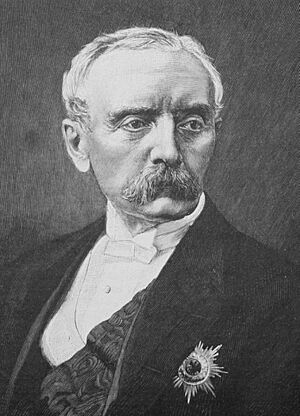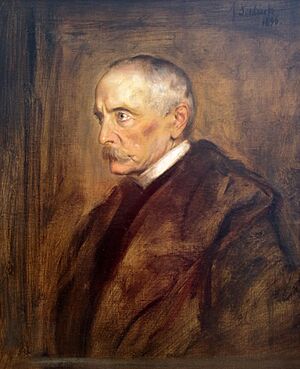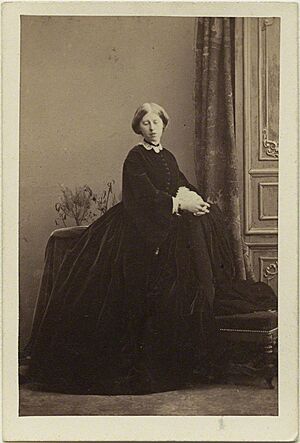Chlodwig, Prince of Hohenlohe-Schillingsfürst facts for kids
Quick facts for kids
Chlodwig zu Hohenlohe-Schillingsfürst
Prince of Hohenlohe-Schillingsfürst
|
|
|---|---|

Chlodwig c. 1894
|
|
| Chancellor of Germany | |
| In office 29 October 1894 – 17 October 1900 |
|
| Monarch | Wilhelm II |
| Deputy |
|
| Preceded by | Leo von Caprivi |
| Succeeded by | Bernhard von Bülow |
| Minister President of Prussia | |
| In office 29 October 1894 – 17 October 1900 |
|
| Monarch | Wilhelm II |
| Preceded by | Botho zu Eulenburg |
| Succeeded by | Bernhard von Bülow |
| State Secretary for Foreign Affairs | |
| In office 20 April 1880 – 1 September 1880 |
|
| Monarch | Wilhelm I |
| Chancellor | Otto von Bismarck |
| Preceded by | Joseph Maria von Radowitz |
| Succeeded by | Friedrich zu Limburg-Stirum |
| Minister President of Bavaria | |
| In office 31 December 1866 – 8 March 1870 |
|
| Monarch | Ludwig II |
| Preceded by | Ludwig von der Pfordten |
| Succeeded by | Otto von Bray-Steinburg |
| Member of the Reichstag | |
| In office 1871–1881 |
|
| Constituency | Oberfranken 3 |
| Personal details | |
| Born |
Chlodwig Carl Viktor zu Hohenlohe-Schillingsfürst
31 March 1819 Rotenburg an der Fulda, Electorate of Hesse, German Confederation |
| Died | 6 July 1901 (aged 82) Bad Ragaz, Switzerland |
| Political party | Independent |
| Other political affiliations |
Imperial Liberal Party (1871–1874) |
| Spouse | Princess Marie von Sayn-Wittgenstein-Sayn |
| Children |
|
| Signature | |
Chlodwig Carl Viktor, Prince of Hohenlohe-Schillingsfürst (born March 31, 1819 – died July 6, 1901), was an important German statesman. People usually called him the Prince of Hohenlohe. He served as the chancellor of the German Empire and minister-president of Prussia from 1894 to 1900.
Before becoming Chancellor, he held many other important jobs. He was the minister-president of Bavaria from 1866 to 1870. He also worked as Germany's Ambassador to Paris and as Foreign Secretary. Later, he was the Imperial Lieutenant of Alsace-Lorraine. He was known as one of the most liberal politicians of his time in Germany.
Contents
Who was Chlodwig zu Hohenlohe-Schillingsfürst?
Chlodwig was born in Rotenburg an der Fulda, in Hesse, Germany. He belonged to the princely family of Hohenlohe. His father, Prince Franz Joseph, was Catholic. His mother, Princess Konstanze, was Lutheran. Chlodwig and his brothers were raised Catholic, following their father's religion.
How did Chlodwig start his career?
As a younger son, Chlodwig needed to choose a career. He first thought about joining the British army. His aunt, Princess Feodora, who was Queen Victoria's half-sister, could have helped him. However, he decided to join the Prussian diplomatic service instead.
He worked in courts and as a civil servant. This early experience taught him a lot about how the Prussian government worked. He saw its strengths and weaknesses. This time also made him a stronger supporter of liberal ideas. He believed in a free press and that progress was vital for a country. He wanted Germany to be united but didn't want Prussia to control everything.
How did Chlodwig become a Prince?
Chlodwig was the second of six sons. In 1840, his older brother, Viktor Moritz Karl, gave up his right to be the Prince of Hohenlohe-Schillingsfürst. Viktor became the Duke of Ratibor and Prince of Corvey instead. Chlodwig also received the title of Prince of Ratibor and Corvey.
In 1841, Chlodwig's father passed away. Chlodwig was next in line to be Prince of Hohenlohe-Schillingsfürst. But he passed the title to his younger brother, Philipp Ernst. He made a deal that if Philipp Ernst died, the title would return to him. When Philipp Ernst died in 1845, Chlodwig became the seventh Prince of Hohenlohe-Schillingsfürst. This new role meant he had a seat in the Bavarian parliament. He then left his job in the Prussian service.
For the next 18 years, Chlodwig's political life was calm. He managed his family estates and attended parliament meetings. He also traveled a lot, visiting places like Rome, Berlin, and England. He met many important people across Europe.
During the Revolution of 1848, Chlodwig supported the idea of a united Germany. He even announced a new German regent to other European courts. This showed his support for liberal ideas.
What was Chlodwig's role in Bavaria?
After the Austro-Prussian War in 1866, Chlodwig pushed for Bavaria to join more closely with Prussia. This was a big step because Bavaria was mainly Catholic, and Prussia was Protestant. King Ludwig II of Bavaria was against losing power. But he eventually agreed after Bismarck secretly helped him with his large debts.
On December 31, 1866, Chlodwig became the Minister-President of Bavaria. This meant he was the head of the Bavarian government. For three years, he was one of the most important politicians in Germany, second only to Bismarck.
What did Chlodwig do as Minister-President?
His main goal was to unite the southern German states with the North German Confederation. He helped reorganize the Bavarian army to be like Prussia's. He also helped create a customs parliament, which made trade easier between the states. He was even chosen as a vice-president of this parliament.
Chlodwig also strongly disagreed with the First Vatican Council's ideas about the Church. He believed that the Pope's policy of opposing the modern state would harm both the Church and the state. He also worried about the idea of papal infallibility. He tried to get other Catholic countries to stop this dogma from being defined.
However, other powerful countries did not want to get involved. In Bavaria, a strong group that supported the Pope teamed up with Bavarian patriots. They accused Chlodwig of giving away Bavaria's independence to Prussia. This group was too strong for him. A law he proposed to limit the Church's power in education was defeated. He was forced to resign on March 7, 1870.
How did Chlodwig continue to influence Germany?
Even after leaving office, Chlodwig remained very influential in Munich and Berlin. The treaty between the North German Confederation and Bavaria, which included his ideas, was accepted. He was elected to the German Reichstag (parliament) and became a vice-president.
He helped create the Imperial Liberal Party. This party supported the new German Empire and wanted it to grow with liberal ideas. They also opposed the Catholic Centre Party. Chlodwig strongly supported Bismarck's anti-Church policies, known as the Kulturkampf. He even suggested some of the main ideas for these policies.
In 1873, Bismarck chose Chlodwig to be the German ambassador in Paris. He stayed there for seven years. In 1878, he attended the Congress of Berlin, an important meeting of European powers. In 1880, he temporarily led Germany's Foreign Office.
In 1885, Chlodwig became the governor of Alsace-Lorraine. This region was taken by Germany after the war with France in 1870. He had to enforce strict rules from Bismarck. But his calm and friendly nature helped the people of Alsace-Lorraine accept German rule more easily.
Why was Chlodwig chosen as Chancellor of Germany?

Chlodwig stayed in Strasbourg until October 1894. Even though he was quite old, Emperor William II strongly asked him to become the new Chancellor. He took over from Leo von Caprivi.
During his time as Chancellor, Chlodwig was less visible in public than previous Chancellors. He rarely appeared in parliament. He gave a lot of freedom to his secretaries of state.
What happened during Chlodwig's Chancellorship?
Chlodwig appointed Adolf Marschall von Bieberstein as Foreign Secretary. Bieberstein also helped him in the Prussian cabinet and spoke for him in parliament. However, Bieberstein often disagreed with William II, who wanted more personal control over foreign policy. He was also opposed by farmers who wanted to keep high taxes on grain. In 1897, Bieberstein was replaced by Bernhard von Bülow.
That same year, William II made many changes in government positions. One important change was appointing Alfred von Tirpitz to lead the German Imperial Naval Office. These changes meant that Chlodwig's power as Chancellor was reduced. He could not stop Germany from becoming more focused on global power and building up its navy.
Important events like Germany getting closer to Russia and its relationship with Great Britain getting worse happened without much input from him. He also had little say in Germany's response to the Boxer Rebellion.
Chlodwig tried to quietly oppose the Emperor's interference in state affairs. He started reforms for the Prussian Military Law in 1898 and the Law on Associations in 1899. During his time, the new German Civil Code was also adopted in 1896. Chlodwig resigned as Chancellor on October 17, 1900. Bernhard von Bülow took his place.
When did Chlodwig zu Hohenlohe-Schillingsfürst die?
Chlodwig died on July 6, 1901, in Bad Ragaz, Switzerland. He was 82 years old.
Who was Chlodwig's family?
On February 16, 1847, Chlodwig married Princess Marie of Sayn-Wittgenstein-Sayn. She was born in Saint Petersburg, Russia. Marie inherited huge estates in Russia. Because of this, they made two long visits to Verkiai, Lithuania, to manage these properties.
Chlodwig and Marie had six children:
- Elisabeth Constanze Leonille Stephanie (1847–1915)
- Stephanie Marie Antonie (1851–1882)
- Philipp Ernst, 4th Prince of Hohenlohe-Schillingsfürst (1853–1915)
- Albert (1857–1866)
- Moritz, 5th Prince of Hohenlohe-Schillingsfürst (1862–1940)
- Alexander (1862–1924)
Honours
He received the following orders and decorations:
 House of Hohenlohe: Knight of the House Order of the Phoenix, 1st Class
House of Hohenlohe: Knight of the House Order of the Phoenix, 1st Class Prussia:
Prussia:
- Grand Cross of the Red Eagle, 16 May 1870
- Knight of the Black Eagle, 5 December 1878; with Collar, 1879
- Grand Commander's Cross of the Royal House Order of Hohenzollern, 1896; with Star, 15 June 1898
- Red Cross Medal, 1st Class, 27 January 1899
 Anhalt: Grand Cross of the Order of Albert the Bear
Anhalt: Grand Cross of the Order of Albert the Bear
 Austria-Hungary:
Austria-Hungary:
- Grand Cross of the Royal Hungarian Order of St. Stephen, 1868; in Brilliants, 1900
- Knight of the Golden Fleece, 1896
 Bavaria:
Bavaria:
- Grand Cross of Merit of the Bavarian Crown, 1868
- Knight of St. Hubert, 1870
 Baden:
Baden:
- Knight of the House Order of Fidelity, 1887
- Knight of the Order of Berthold the First, 1887


 Ernestine duchies: Grand Cross of the Saxe-Ernestine House Order
Ernestine duchies: Grand Cross of the Saxe-Ernestine House Order France: Grand Cross of the Legion of Honour, July 1878
France: Grand Cross of the Legion of Honour, July 1878 Italy: Knight of the Annunciation, 22 March 1897
Italy: Knight of the Annunciation, 22 March 1897 Sovereign Military Order of Malta: Knight of Honour and Devotion
Sovereign Military Order of Malta: Knight of Honour and Devotion Mecklenburg: Grand Cross of the Wendish Crown, with Crown in Ore
Mecklenburg: Grand Cross of the Wendish Crown, with Crown in Ore Netherlands: Grand Cross of the Netherlands Lion
Netherlands: Grand Cross of the Netherlands Lion Oldenburg: Grand Cross of the Order of Duke Peter Friedrich Ludwig, with Golden Crown
Oldenburg: Grand Cross of the Order of Duke Peter Friedrich Ludwig, with Golden Crown Ottoman Empire: Order of Osmanieh, 1st Class in Brilliants
Ottoman Empire: Order of Osmanieh, 1st Class in Brilliants Tunisia: Grand Cordon of the Order of Glory
Tunisia: Grand Cordon of the Order of Glory Portugal: Grand Cross of the Tower and Sword, with Collar
Portugal: Grand Cross of the Tower and Sword, with Collar Russia: Knight of St. Andrew
Russia: Knight of St. Andrew San Marino: Grand Cross of the Order of San Marino
San Marino: Grand Cross of the Order of San Marino Saxe-Weimar-Eisenach: Grand Cross of the White Falcon, 1880
Saxe-Weimar-Eisenach: Grand Cross of the White Falcon, 1880 Saxony: Knight of the Rue Crown, 1895
Saxony: Knight of the Rue Crown, 1895 Spain: Grand Cross of the Order of Charles III, with Collar, 11 January 1886
Spain: Grand Cross of the Order of Charles III, with Collar, 11 January 1886 Holy See: Grand Cross of St. Gregory the Great
Holy See: Grand Cross of St. Gregory the Great Württemberg: Grand Cross of the Württemberg Crown, 1867
Württemberg: Grand Cross of the Württemberg Crown, 1867
See also
 In Spanish: Clodoveo de Hohenlohe-Schillingsfürst para niños
In Spanish: Clodoveo de Hohenlohe-Schillingsfürst para niños
 | William L. Dawson |
 | W. E. B. Du Bois |
 | Harry Belafonte |


